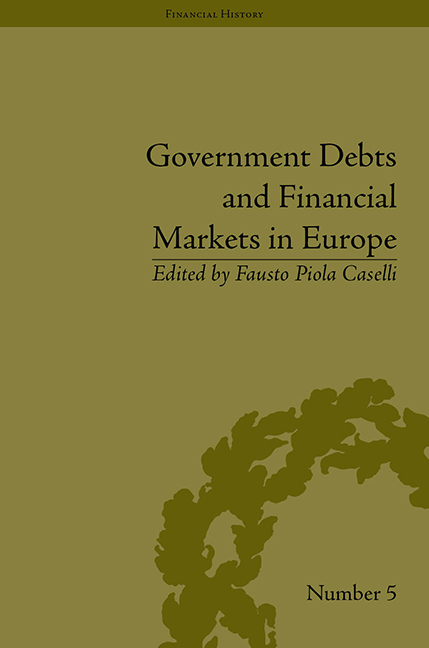Book contents
- Frontmatter
- CONTENTS
- Contributors
- List of Charts and Tables
- Introduction
- 1 The Financial Administration of North Hanseatic Cities in the Late Middle Ages: Development, Organization and Politics
- 2 Government Debts and Credit Markets in Renaissance Italy
- 3 Government Debts and Financial Markets in Castile between the Fifteenth and Sixteenth Centuries
- 4 Government Debt and Financial Markets: Exploring Pro-Cycle Effects in Northern Italy during the Sixteenth and the Seventeenth Centuries
- 5 Government Policies and the Development of Financial Markets: The Case of Madrid in the Seventeenth Century
- 6 The Role Played by Short-Term Credit in the Spanish Monarchy's Finances
- 7 From Subordination to Autonomy: Public Debt Policies and the Creation of a Self-Ruled Financial Market in the Kingdom of Naples in the Long Run (1500–1800)
- 8 Public Debt in the Papal States: Financial Market and Government Strategies in the Long Run (Seventeenth–Nineteenth Centuries)
- 9 Towards a New Public Credit Policy in Eighteenth-Century Spain: the Introduction of the Tesorería Mayor de Guerra (1703–6)
- 10 French Public Finance between 1683 and 1726
- 11 Long-Term War Loans and Market Expectations in England, 1743–50
- 12 Mercantilist Institutions for the Pursuit of Power with Profit: The Management of Britain's National Debt, 1756–1815
- 13 Italian Government Debt Sustainability in the Long Run, 1861–2000
- 14 Times of Wasteful Abundance: The Apogee of the Fiscal State in the Federal Republic of Germany from the 1960s to the 1980s
- Conclusion: Final Remarks
- Notes
- Bibliography
- Index
10 - French Public Finance between 1683 and 1726
- Frontmatter
- CONTENTS
- Contributors
- List of Charts and Tables
- Introduction
- 1 The Financial Administration of North Hanseatic Cities in the Late Middle Ages: Development, Organization and Politics
- 2 Government Debts and Credit Markets in Renaissance Italy
- 3 Government Debts and Financial Markets in Castile between the Fifteenth and Sixteenth Centuries
- 4 Government Debt and Financial Markets: Exploring Pro-Cycle Effects in Northern Italy during the Sixteenth and the Seventeenth Centuries
- 5 Government Policies and the Development of Financial Markets: The Case of Madrid in the Seventeenth Century
- 6 The Role Played by Short-Term Credit in the Spanish Monarchy's Finances
- 7 From Subordination to Autonomy: Public Debt Policies and the Creation of a Self-Ruled Financial Market in the Kingdom of Naples in the Long Run (1500–1800)
- 8 Public Debt in the Papal States: Financial Market and Government Strategies in the Long Run (Seventeenth–Nineteenth Centuries)
- 9 Towards a New Public Credit Policy in Eighteenth-Century Spain: the Introduction of the Tesorería Mayor de Guerra (1703–6)
- 10 French Public Finance between 1683 and 1726
- 11 Long-Term War Loans and Market Expectations in England, 1743–50
- 12 Mercantilist Institutions for the Pursuit of Power with Profit: The Management of Britain's National Debt, 1756–1815
- 13 Italian Government Debt Sustainability in the Long Run, 1861–2000
- 14 Times of Wasteful Abundance: The Apogee of the Fiscal State in the Federal Republic of Germany from the 1960s to the 1980s
- Conclusion: Final Remarks
- Notes
- Bibliography
- Index
Summary
Introduction
From the Peace of the Pyrenees (1659) to Waterloo (1815), France was the dominant power in Europe. Meanwhile, Britain rose, politically and economically. Public finance is one of the areas where the contest and the contrast between the two powers is the clearest. Following a crucial political transformation in 1688, Britain innovated and acquired the financial institutions and tools that enabled its final supremacy. France, it would seem, let its size advantage fritter away and this stretch of time was just as much time lost.
On closer inspection, the picture is not so simple. I argue that the period of French financial history extending from 1683 to 1726 displays much turmoil, experimentation and innovation. France did not suffer from a lack of financial instruments, indeed some in 1720 probably thought it had far too many. As for institutions, they are all experiments that have succeeded, and thus cannot serve as explanations.
Successive French governments were aware of the contest in which they were engaged. The last wars of Louis XIV required extraordinary efforts to raise the necessary resources. After the king's death in 1715, there followed a period of ten years during which solutions were sought, debated, and tried. The brief French career of John Law, theorist and policymaker, might seem exceptional, but was in fact emblematic. Partly to deflect attention from John Law, I will use the career of four famous but poorly-known financiers, the Paris brothers, as a thread through this narrative.
In the rest of this introduction I give a rapid biographical sketch of the Paris brothers, then describe the broad geopolitical context of the period I study and the fiscal and financial instruments then in use. The narrative itself is roughly chronological and naturally divided in three by the John Law episode. I emphasize the innovations in the periods before, during, and after Law.
The Paris Brothers
Who are these famous but poorly known figures of French financial history? The Paris brothers were the children of Jean Paris (1643–97) and Justine Trenannay La Montagne (d. 1722).
- Type
- Chapter
- Information
- Government Debts and Financial Markets in Europe , pp. 135 - 166Publisher: Pickering & ChattoFirst published in: 2014



